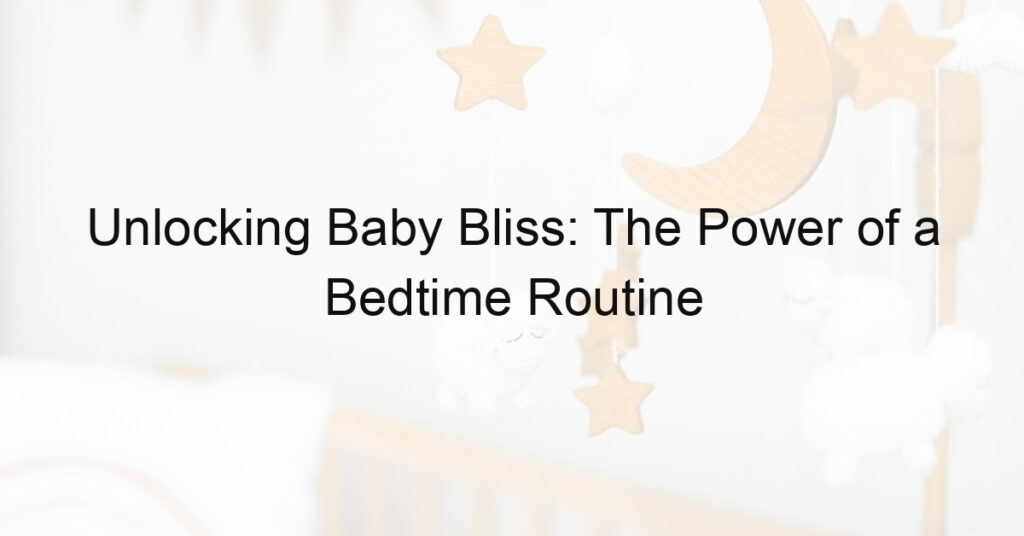
Introduction: The Importance of Sleep Schedule for Infants
Every parent knows the importance of sleep, not just for their own rest, but more importantly, for their baby’s growth and development. This article aims to provide a comprehensive understanding of the significance of a sleep schedule for infants and the role of a bedtime routine in establishing it.
- Overview of the Importance of Sleep for Babies
- Introduction to the Concept of a Bedtime Routine
Sleep is not just a time for rest, but it’s a critical period for an infant’s growth and development. During sleep, babies’ brains are busy processing the day’s experiences, forming neural connections that pave the way for future learning and development. According to the National Sleep Foundation, newborns need between 14 to 17 hours of sleep a day for the first three months of their lives. This sleep is crucial for their physical growth, brain development, and immune system strength.
A bedtime routine is a set of activities performed in the same order each night before sleep. It signals to the baby that it’s time to wind down and get ready for bed. This routine can include activities like a warm bath, a bedtime story, or a lullaby. The consistency of a bedtime routine helps regulate the baby’s internal clock, leading to better sleep quality and duration. It also provides a comforting, predictable environment that can help ease separation anxiety and promote a sense of security in infants.
In the following sections, we will delve deeper into understanding baby sleep patterns, establishing a bedtime routine, and the benefits it brings. We will also explore different infant sleep training methods and common baby sleep habits. The goal is to equip you with the knowledge and tools to create a beneficial sleep schedule for your baby, ensuring their optimal growth and development.
Understanding Baby Sleep Patterns
Understanding the sleep patterns of babies is crucial for their health and development. Let’s delve into how these patterns differ from adults and how they change as the baby grows.
- How baby sleep patterns differ from adults
- Changes in sleep patterns as the baby grows
Babies have a different sleep cycle compared to adults. While adults usually have a sleep cycle that lasts about 90 minutes, a newborn’s sleep cycle is much shorter, around 50 minutes. This is why babies often wake up after a short period of sleep.
Moreover, babies spend more time in rapid eye movement (REM) sleep, which is a stage of sleep where dreams occur. About half of their sleep time is spent in REM sleep, compared to only about 20% for adults. This REM sleep is essential for the intense brain development happening during this time.
As babies grow, their sleep patterns start to change. By the time they are three months old, their sleep cycle lengthens to about 70 minutes. By six months, it’s closer to the adult cycle of 90 minutes.
Additionally, the amount of time babies spend in REM sleep decreases as they grow. By the age of six months, only about 30% of their sleep is REM sleep. And by the time they are a year old, it’s closer to the 20-25% that adults experience.
In conclusion, understanding your baby’s sleep patterns can help you better meet their needs and promote healthy sleep habits. Remember, every baby is unique and may not follow these exact patterns. It’s always best to consult with a healthcare professional if you have concerns about your baby’s sleep.
Establishing a Baby Bedtime Routine
Establishing a bedtime routine for your baby is an essential step in their development. It helps to set a rhythm for their body and mind, promoting better sleep and overall health. But when is the right time to start this routine? Let’s delve into this topic.
When to Start
Knowing when to start a bedtime routine for your baby can be a bit tricky. It’s not a one-size-fits-all answer, as every baby is unique. However, there are some general guidelines and signs to look out for.
- Best age to start a bedtime routine
- Signs your baby is ready for a routine
Most experts agree that the best time to start a bedtime routine is when your baby is between 6 and 8 weeks old. At this age, babies start to develop a natural sleep-wake cycle, and a bedtime routine can help to strengthen this cycle.
There are several signs that your baby may be ready for a bedtime routine. These include showing signs of sleepiness at the same time each night, becoming more active during the day and less active at night, and being able to stay awake for longer periods during the day. If your baby is showing these signs, it might be a good time to start a bedtime routine.
Remember, every baby is different, and what works for one might not work for another. It’s important to be patient and flexible as you establish a bedtime routine. With time and consistency, your baby will start to understand and anticipate the routine, leading to better sleep for both of you.
Steps to Establish a Routine
Establishing a routine for your baby’s bedtime can be a game-changer. It can help your baby understand when it’s time to sleep, and it can also give you some much-needed rest. Here are three key steps to establish a successful bedtime routine:
- Creating a Calming Environment
- Consistent Bedtime Activities
- Setting a Consistent Bedtime
First, it’s important to create a calming environment for your baby. This can be done by dimming the lights, reducing noise, and keeping the room at a comfortable temperature. Soft, soothing music or a white noise machine can also be helpful. The goal is to make the room a place where your baby feels safe and relaxed.
Next, establish consistent bedtime activities. This could include a warm bath, a bedtime story, or a lullaby. These activities should signal to your baby that it’s time to sleep. The key is consistency – doing the same activities, in the same order, every night.
Finally, set a consistent bedtime. This doesn’t have to be the exact same time every night, but it should be within a 30-minute window. For example, if you choose 7:30 as your baby’s bedtime, aim to start the bedtime routine between 7:00 and 7:30 every night. This consistency helps your baby’s internal clock understand when it’s time to sleep.
Remember, establishing a routine takes time and patience. It may take a few weeks for your baby to adjust to the new schedule. But once they do, you’ll likely see a big improvement in their sleep – and yours too!
Benefits of a Baby Bedtime Routine
Establishing a bedtime routine for your baby is not just about getting them to sleep through the night. It also has numerous benefits that contribute to your child’s overall health and development. Here are some key advantages:
- Improved Sleep Quality
- Reduced Nighttime Awakenings
- Enhanced Cognitive Development
- Increased Parent-Baby Bonding Time
When a consistent bedtime routine is established, your baby’s internal clock becomes accustomed to this schedule. This leads to improved sleep quality as their body learns when it’s time to wind down and rest.
With a regular sleep schedule, babies are less likely to wake up frequently during the night. This allows for longer periods of uninterrupted sleep, which is crucial for their growth and development.
Quality sleep is linked to enhanced cognitive development in babies. It aids in the growth of neural connections that are essential for learning, memory, and emotional regulation.
A bedtime routine often involves activities like reading a book or singing a lullaby. These shared moments can foster a stronger bond between you and your baby, enhancing emotional security and attachment.
These benefits highlight the importance of establishing a consistent bedtime routine for your baby. It’s not just about getting a good night’s sleep, but also about promoting healthy growth and development in your child.
Infant Sleep Training Methods
One of the most effective ways to ensure a good night’s sleep for both you and your baby is through sleep training. There are various methods available, but today we will focus on one of the most popular ones – the Ferber Method.
Ferber Method
The Ferber method, also known as graduated extinction, is a sleep training technique developed by Dr. Richard Ferber. This method encourages parents to allow their baby to self-soothe and fall asleep on their own, with the parent gradually increasing the time they wait before responding to their baby’s cries.
- Overview of the Ferber method
- Pros and Cons
The Ferber method involves putting your baby to bed when they’re sleepy but still awake. If your baby cries, you wait for a predetermined amount of time before going in to comfort them. Each night, you gradually increase the waiting time. This process continues until your baby can fall asleep independently.
| Pros | Cons |
|---|---|
| Teaches baby to self-soothe and sleep independently | Can be emotionally challenging for parents |
| Can result in longer, uninterrupted sleep | May not be suitable for all babies |
| Establishes a consistent sleep routine | May lead to increased crying in the short term |
While the Ferber method has proven to be effective for many families, it’s important to remember that every baby is unique. What works for one might not work for another. Always consult with your pediatrician before starting any sleep training program.
Baby Sleep Whisperer Method
The Baby Sleep Whisperer method is another popular approach to infant sleep training. Let’s delve into its details and weigh its pros and cons.
- Overview of the Baby Sleep Whisperer method
- Pros and Cons
- It fosters a strong parent-child bond.
- It can be tailored to your baby’s individual needs.
- It encourages healthy sleep habits from an early age.
- It may take longer to see results compared to other methods.
- It requires a lot of patience and consistency from parents.
- It may not be suitable if your baby has severe sleep issues.
The Baby Sleep Whisperer method is a gentle, nurturing approach to sleep training. It emphasizes the importance of understanding your baby’s unique sleep cues and patterns. The method encourages parents to respond to their baby’s needs promptly, which fosters a sense of security and trust. This method is all about creating a calm, soothing sleep environment and establishing a consistent bedtime routine.
| Pros | Cons |
|---|---|
|
|
|
In conclusion, the Baby Sleep Whisperer method can be a great option if you’re looking for a gentle, responsive approach to sleep training. However, it’s important to remember that every baby is unique, and what works for one might not work for another. Always consult with a healthcare professional if you have concerns about your baby’s sleep.
Common Baby Sleep Habits
Understanding the common sleep habits of babies is crucial for parents. It helps in establishing a consistent bedtime routine and ensuring the overall well-being of the baby. In this section, we will delve into the baby sleep cycles and common sleep disruptions.
- Understanding Baby Sleep Cycles
Babies, especially newborns, have different sleep cycles compared to adults. A sleep cycle refers to the pattern of REM (Rapid Eye Movement) and non-REM sleep. An adult’s sleep cycle lasts about 90 minutes, but a newborn’s cycle is much shorter, around 50 minutes.
During the first few months, babies spend more time in REM sleep, which is a lighter sleep stage. This is why they wake up frequently. As they grow older, the amount of non-REM sleep increases, leading to longer sleep periods.
- Common Sleep Disruptions and How to Handle Them
There are several reasons why your baby might be having trouble sleeping. These can include teething, illness, or changes in routine. Understanding these disruptions can help you handle them effectively.
| Common Sleep Disruptions | How to Handle |
|---|---|
| Teething | Use a teething ring or a cold spoon to soothe the baby’s gums before bedtime. |
| Illness | Consult with a pediatrician. They may recommend adjusting the baby’s sleep schedule or using a humidifier. |
| Changes in routine | Try to keep the bedtime routine consistent. If changes are necessary, introduce them gradually. |
Remember, every baby is unique and what works for one might not work for another. It’s important to be patient and try different strategies to see what works best for your baby.
Importance of a Consistent Bedtime for Babies
Establishing a consistent bedtime for your baby is not just about getting them to sleep through the night. It’s also about setting the stage for healthy sleep habits that will last a lifetime. Let’s explore how consistency aids in sleep training and impacts your baby’s circadian rhythm.
- How consistency aids in sleep training
- Impact of a consistent bedtime on baby’s circidian rhythm
Consistency is key when it comes to sleep training. By establishing a regular bedtime, you’re teaching your baby to associate certain cues with sleep. This could be a bath, a bedtime story, or a lullaby. Over time, these cues will signal to your baby that it’s time to wind down and go to sleep. This makes the transition from wakefulness to sleep smoother and less stressful for both you and your baby.
Our bodies have an internal clock, known as the circadian rhythm, that regulates our sleep-wake cycle. Babies are no different. By setting a consistent bedtime, you’re helping to regulate your baby’s circadian rhythm. This means that your baby will start to feel sleepy around the same time each night, making it easier for them to fall asleep and stay asleep. A consistent bedtime also ensures that your baby gets the recommended amount of sleep for their age, which is crucial for their growth and development.
In conclusion, a consistent bedtime is not just about getting a good night’s sleep. It’s about establishing healthy sleep habits that will benefit your baby for years to come. So, make bedtime a priority and stick to it. Your baby (and you!) will thank you.
Creating a Baby Sleep Schedule
Creating a baby sleep schedule is a crucial step in establishing a healthy routine for your infant. It not only ensures that your baby gets the necessary amount of sleep, but it also provides a predictable routine that can help make your life as a parent easier. However, creating a baby sleep schedule is not a one-size-fits-all process. It requires careful consideration of various factors and adjustments according to your baby’s age.
- Factors to Consider When Creating a Sleep Schedule
When creating a sleep schedule for your baby, it’s important to consider the following factors:
- Baby’s Age: Newborns sleep a lot but in short bursts, while older babies can sleep for longer periods. The sleep schedule should be adjusted according to the baby’s age.
- Baby’s Sleep Needs: Every baby is unique and so are their sleep needs. Some babies need more sleep than others. Pay attention to your baby’s sleep cues to understand their sleep needs.
- Time of Day: It’s important to consider the time of day when scheduling naps and bedtime. A consistent bedtime can help regulate your baby’s internal clock and promote better sleep.
- Baby’s Feeding Schedule: Feeding times can greatly affect your baby’s sleep schedule. A baby might need a nap after a feed or might wake up from sleep due to hunger.
- Sample Sleep Schedules for Different Ages
Here are some sample sleep schedules for babies of different ages. Remember, these are just guidelines and might need to be adjusted according to your baby’s individual needs.
| Age | Total Sleep (24 hrs) | Nighttime Sleep | Daytime Sleep (Naps) |
|---|---|---|---|
| Newborn | 14-17 hours | 8-9 hours | 7-9 hours (3-5 naps) |
| 3-4 months | 14-16 hours | 9-10 hours | 4-5 hours (3-4 naps) |
| 6-9 months | 12-14 hours | 10-11 hours | 2-3 hours (2-3 naps) |
| 1 year | 12-14 hours | 10-12 hours | 2-3 hours (1-2 naps) |
Creating a baby sleep schedule can be a trial and error process. What works for one baby might not work for another. The key is to be patient, flexible, and attentive to your baby’s needs.
Nighttime Routine for Newborns
Creating a nighttime routine for newborns is a crucial step in establishing healthy sleep habits. It’s important to understand that a newborn’s routine differs significantly from that of an older child or adult. Let’s delve into the unique aspects of a newborn’s nighttime routine and some helpful tips for establishing one.
- How a nighttime routine differs for newborns
- Tips for establishing a routine with a newborn
- Consistent Bedtime: Try to put your baby to sleep at the same time every night. This helps regulate their internal clock and promotes better sleep.
- Bedtime Rituals: Incorporate calming activities such as a warm bath, a gentle massage, or reading a book before bed. These rituals signal to your baby that it’s time to sleep.
- Comfortable Environment: Ensure your baby’s sleep environment is quiet, dark, and at a comfortable temperature. A white noise machine or a fan can help drown out disruptive noises.
- Feed before Bed: A full tummy can help your baby sleep longer. Try to feed your baby right before bedtime.
Newborns have different sleep patterns compared to older children and adults. They typically sleep in short bursts of two to four hours throughout the day and night. This is because their tiny stomachs need frequent refueling, often resulting in wakefulness. Therefore, a nighttime routine for a newborn is less about a strict schedule and more about creating a calming environment that signals bedtime.
Establishing a routine with a newborn can be a challenge, but with patience and consistency, it’s achievable. Here are some tips:
Remember, every baby is unique and what works for one might not work for another. It’s all about finding what works best for your baby and sticking to it. Consistency is key when it comes to establishing a successful nighttime routine.
Conclusion: The Power of a Bedtime Routine
In this article, we’ve explored the importance of a bedtime routine for infants. It’s clear that establishing a consistent sleep schedule can have a profound impact on your child’s development and well-being. Let’s recap the key points and benefits.
- Recap of the importance and benefits of a bedtime routine: A regular bedtime routine helps your baby understand when it’s time to sleep. This predictability can reduce bedtime struggles and promote better sleep quality. Studies show that infants with a consistent bedtime routine sleep longer and wake up less frequently during the night. Moreover, a bedtime routine can also foster a sense of security and strengthen the parent-child bond.
- Encouragement for parents to establish and maintain a routine: As a parent, your role is crucial in establishing and maintaining a bedtime routine. It may not be easy at first, but the benefits are worth the effort. Remember, consistency is key. Start with simple steps like a warm bath, a bedtime story, or a lullaby. Gradually, your baby will associate these activities with sleep. Don’t be discouraged if progress seems slow. Every baby is unique and adjusts to routines at their own pace. Your patience and persistence will pay off in the form of a well-rested, happier baby.
As we conclude, remember the power of a bedtime routine. It’s more than just a schedule; it’s a tool that sets the foundation for your child’s healthy growth and development. So, take the leap and start establishing a bedtime routine today. Your baby’s sweet dreams are just a routine away!














